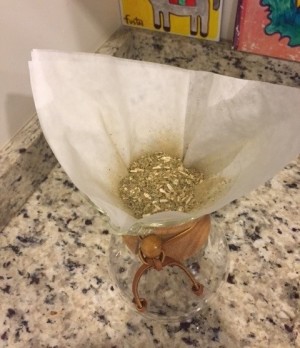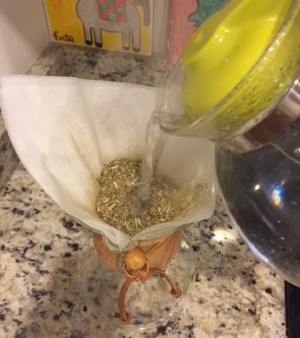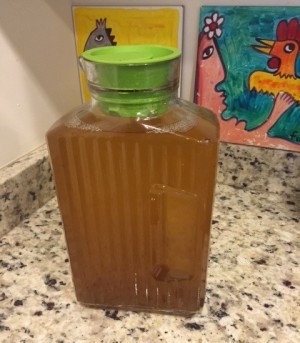
[Alert] Ancient Tonic Found to Reduce Parkinson’s Disease Risk
- A decade of work comes to fruition with this medical breakthrough. Find out more…
- Discover how to cut your risk of Parkinson’s Disease by a third while burning fat and combating inflammation
- Step-by-step instructions on how to make this ancient health tonic.
Editor’s Note: Today, Living Well is releasing our best solution for improving both your bone AND heart health. It’s our newest addition to our non-GMO supplement line, and it’s called D3+K2. D3+K2 delivers you the research-backed dose and forms of vitamin D3 and vitamin K2 – the two best natural ingredients shown in human studies to help support bone strength and help reverse arterial stiffness. If you want to maintain a healthy heart, flexible arteries, and strong bones, this is the one solution you need. Click here for more information and secure your supply.
If you are a Living Well Daily Insider, you automatically qualify for 20 percent off your order!
Dear Reader,
Parkinson’s disease is slow-developing yet progressive neurological disorder.
Most patients experience their first symptoms around the age of 60 or older, and they can be as benign as a barely noticeable tremor in the finger or hand.
However, as the disease progresses, the symptoms can progress to serious difficulties in speaking, locomotion, coordination, and balance.
Every year, over 60,000 Americans are diagnosed with Parkinson’s disease.
But the numbers only start here.
Currently, there are as many 1 million Americans suffering from Parkinson’s disease and an estimated 10 million people worldwide.
And these numbers don’t include the thousands of cases that go undetected.
Plus, Parkinson’s comes with a hefty price tag — the combined direct and indirect costs of Parkinson’s are an estimated whopping $25 billion annually in just the U.S.1
Recently, Australian researchers at La Trobe University in Melbourne made an unparalleled advancement in Parkinson’s disease research and diagnosis.
With funding from the Michael J. Fox Foundation for Parkinson’s Research, the team of scientist led by microbiology professor Dr. Paul Fisher developed the first blood test that can determine if a patient has Parkinson’s disease. We will give you the details in just a bit.
With this new discovery, medical providers will be able to speed up diagnosis of the neurological disorder and implement crucial treatments earlier, which could improve countless lives and may even help reduce costs.
And while this test is great news for early medical intervention, there is a natural solution that can help reduce the risk of Parkinson’s — one that has been used for centuries as a health booster.
We will reveal this health tonic, how it can protect you from Parkinson’s disease, and how to make it in a moment.
Let’s talk about this blood test first…
![]() A Decade’s Discovery
A Decade’s Discovery
The new blood test detects the abnormal blood cells that cause Parkinson’s disease. And since there is no cure for Parkinson’s currently, results from this test will permit patients to receive treatment quickly — hopefully, before brain damage starts.
Fisher had this to say about his team’s revolutionary discovery:
Early diagnosis and treatment could enable better outcomes and greater quality of life for people with the condition, which will be of great benefit to sufferers and their families.2
The scientists’ work is based in work started over 10 years ago when they discovered “alarms” were switched on in cells. These alarms were suspected to be liable for Parkinson’s and other incurable conditions that have faulty mitochondria.
When unusual activity occurs in cells with diseased mitochondria, it can trigger movements that may cause damage to vital brain cells.
Fisher and his team will continue their blood cell research in hopes of uncovering information that could eventually lead to a cure for Parkinson’s.
While this is great news for folks who are already suspected to suffer from Parkinson’s, there is an easy and healthy way to reduce the likelihood of Parkinson’s disease by a third for folks who don’t have Parkinson’s.
So what is this Parkinson’s fighter?
![]() Power Plant of the Ancients
Power Plant of the Ancients
Yerba mate.
This South American plant is found in parts of Brazil, Paraguay, Argentina, and other South American countries. It’s been used by the native peoples of these regions for both social and medicinal practices for centuries, typically as a tea.
However, a study released in the Journal of the Neurological Sciences reveals that yerba mate also has a protective role in the development of Parkinson’s disease.
The study examined hospital records of those who drank yerba mate regularly. And after being matched with two controls and variables like smoking status and alcohol intake were considered, the research found yerba mate drinkers reduced their chances of suffering from Parkinson’s disease to just 63 percent.3
This means drinking yerba mate tea can reduce your risk of Parkinson’s by a third!
Researchers believe yerba mate’s bioactive compound content is one of the reasons why it’s an effective Parkinson’s preventative. These include xanthines, phenolics, theobromine, and caffeine.
While more research is needed, it’s a good idea to start incorporating yerba mate into your daily routine.
Plus, it has more health benefits!
Yerba mate is full of natural phenolic compounds and antioxidants (natural cancer-fighters and metabolism boosters). It’s also good for a quick pick-me-up, as it has a caffeine content equal to most coffees.4
Not to mention yerba mate signals the body to burn more fat, regulates blood sugar levels, and helps reduce inflammation related to obesity.5
While it can be enjoyed hot, the iced version can be refreshing treat as well.
This makes yerba mate a great choice for iced tea in the coming hot months of summer — you can quench your thirst while fighting Parkinson’s and enjoying other health benefits!
Here’s the best way to brew it…
![]() Get the Health Without the Grit
Get the Health Without the Grit
Yerba mate is a leafy and at times even dusty loose tea. This can make for a gritty and cloudy iced tea experience.
Chemex brewing yerba mate is a great way enjoy it and to accentuate its refreshing and earthy flavor while also preventing leaves and other small particles from swimming in your glass.
To do this, you are going to need the following items:
- 1 8-cup Chemex
- 1 8-cup Chemex filter
- 50 g loose yerba mate tea
- 40 oz. of just-boiled water
- 1 1-gallon tea pitcher.
Here’s how you do it:

- Rinse the filter and place in the Chemex.

- Add tea.

- Slowly pour 40 oz. of water over the tea.

- Remove filter and allow to cool completely.

- Pour into gallon pitcher and add enough water to fill the gallon container.
This can be stored in the refrigerator for up to one week.
Yerba mate is available in most health food stores. To order it online, click here.
If you are interesting in a Chemex brewer (also great for coffee), click here.
Live well,

Natalie Moore
Managing editor, Living Well Daily
Sources
[2] Medical First: Blood Test Detects Parkinson’s Disease
[4] Yerba maté: Pharmacological Properties, Reasearch and Biotechnology
[5] The positive effects of yerba maté (Ilex paraguariensis) in obesity.
Written By Natalie Moore
Natalie Moore is a dedicated health researcher with a passion for finding healthy, natural, and science-based solutions. After a decade of direct healthcare experience in western and natural medicine, she was involved in public health research before joining Living Well Daily.
View More Free Articles
Doctor-Approved Method to Ditch Blood Pressure Meds
In a world where drug solutions dominate healthcare, it’s refreshing to discover that best remedies sometimes don’t involve a single pill. A groundbreaking study shows simple relaxation techniques could be your secret weapon against one of America’s deadliest health conditions. Best of all? It’s free, easy to start right away—and your results are bound to...
Trouble Hearing? Your Heart Could Be at Risk
With research exploding and data pouring in, scientists are uncovering some weird (and surprisingly helpful) health connections. Today’s odd couple? Hearing loss and heart failure. Turns out your ears and your ticker are more connected than you ever imagined. A major study published in the journal Heart looked at over 164,000 people for nearly a...
Stay Up Late? It Could Destroy Your Mental Health
If you dread mornings but come alive at night, there’s concerning new research you need to know about. A recent study found that “night owls” are at higher risk for depression. But before you rush to set your alarm to get up with the sun tomorrow, there’s more to the story… Chronotypes are essentially your...
Go from Flabby to Fit with this Common Vitamin
If you’re like many of us, you woke up one day, looked in the mirror, and realized you’re no spring chicken anymore. Even worse—when you weren’t paying attention—it seems you somehow misplaced the muscles of your youth and have gone from fit to flabby. Aging has a way of humbling us like that. But scientists...
Seasonal Allergy “Off Switch” Discovered in the GUT
“Doc, why am I suddenly suffering from seasonal allergies when I’ve never had them before?” It’s a question I get all the time—and my answer might surprise you. Stop looking up at the trees—and start looking down at your gut… Your sneezing fits, itchy eyes, and runny nose might have more to do with what’s...
“Canary in the Coal Mine” Test Sniffs Out Brain Issues Early
One of the most common questions I get is how to tell if you’re starting to experience cognitive decline. I get it—losing your memory is scary, especially when it sneaks up on you. But here’s some exciting news that might put your mind at ease. A fascinating new study suggests that your nose might be...
BEAT Stubborn Leg Swelling Without Dangerous Diuretics
“I need help with edema.” —Swollen Hi Swollen, When patients complain of edema—fluid retention that causes feet, ankles, and legs to swell—I explain that, while conventional medicine immediately prescribes diuretic drugs, nature offers us effective solutions we can try first. I’ll share those in just a moment, but first, let’s take a quick look at...
Mental Health Linked to 30% FASTER Aging [6-Step FIX]
Your mind and body are more connected than you might realize—and a groundbreaking new study proves just how profound that connection really is. In fact, it’s this mind-body link that helps explain why battling depression can put you on the fast track to physical decline. Depression is the most common mental health condition worldwide. We’ve...
The Air You Breathe Is Silently Stealing Your Memory
You already know that air pollution damages your lungs. Chances are you’ve heard it can also harm your heart. And I bet you won’t be surprised when I tell you it claims millions of lives annually. But now, alarming new research suggests polluted air might also damage your brain. This study found that long-term exposure...
Get Intermittent Fasting Benefits Without Going Hungry
Intermittent fasting, which involves cycling between eating and fasting periods, is effective. There’s plenty of evidence for that. It’s not just weight loss, either. Intermittent fasting has significant benefits for metabolic health. However, many people find fasting difficult to stick to—and others can’t do it at all due to medical issues—so they miss out on...









